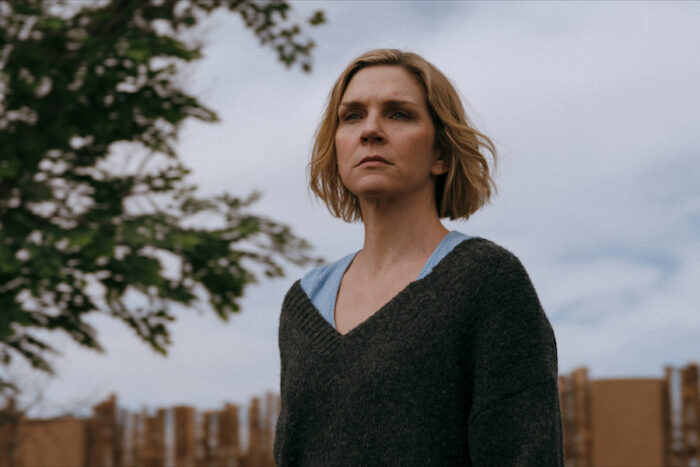Why you should be watching Pluribus
Review Overview
Cast
9Creepiness
9Comedy
9Ivan Radford | On 09, Nov 2025
“Are you a fan of mindless crap?” That’s how we meet Carol (Rhea Seehorn), the author of the bestselling series The Winds of Wycaro. She, much to her own displeasure, isn’t a fan of mindless crap, despite how popular her trashy fantasy romance novels are – although we soon realise that most things are to Carol’s displeasure in some way or another. Which is ironic, given that she soon finds herself surrounded by a lot of upbeat people – all of them fuelled by an epidemic of mindless crap.
It’s an intriguing set-up for a drama, and it perhaps comes as no surprise that it hails from Breaking Bad creator Vince Gilligan – it arrives with a delicate grasp of tone, a keen observation of its leading lady and a dark sense of humour. It also comes with more than an echo of Vince’s X-Files days, as we soon realise that we’re not just watching a noir-tinged character piece but a dystopian sci-fi.
While Carol is facing the nightmare of a book signing with fans she despises, another nightmare is unfolding in an unseen lab: an alien virus that rapidly spreads across the globe. Its effect? To make you blissfully happy, with no thoughts, opinions or feelings of your own. Carol, for reasons unknown to anyone including her and the alien hive mind, is immune to the virus – and so she begins a quest to save the world from its own positivity.
It’s an inspired idea for a satire, one that recalls the CBS comedy BrainDead, which saw the world invaded by aliens who turned everyone into angry, illogical, polarised antagonists. While that show’s commentary was amusingly pointedly unsubtle, Pluribus brings more nuance simply by flipping the concept on its head. Gilligan’s sharp writing explores how one person can exist in a bubble outside of mainstream society, and how easy it is for groupthink to take hold over a population – not to mention the eerily curious appeal of a cult-like movement that promises to cure all your worries by saving you from having to think about them. But underneath those satirical notes is an even more timely reminder of the value of having more than perspective – if the world all agreed with each other, without any differences of opinion, what would we lose as a diverse race of humans? Indeed, the title stems from an early motto of the USA – “e pluribus unum”, which means “out of many one”. If your identity is shaped both by the community you belong to and the communities you don’t, then having no tension between any of them can only lead to loss of self – and if society is shaped by individuals, that loss of self leaves society lacking too.
All of these rich ideas wouldn’t matter, though, without an emotional core for us to engage with. Rhea Seehorn, who frequently stole every scene going in Breaking Bad prequel Better Call Saul, is phenomenal as Carol, delivering what is almost a one-woman show at times. From the moment we meet her with her agent, Helen (Miriam Shor), we can’t help but root for her discontented creative, who almost finds purpose in the frustration that fuels her. She’s blunt, sarcastic and funny, often with just her facial expressions. By the time she’s attempting to hold on to her sanity while seeing off friendly advances from Zosia (a perfectly smiling Karolina Wydra), she’s a hero of brash awkwardness and uncompromising independence. There’s hilarity in watching her side-eye her TV set, and there’s plucky defiance in her refusal of help – the alien virus is made even more unsettling by its apparent sincerity and compassion – but there’s also a tangible poignancy in Carol’s isolation and grief that’s heart-wrenching to see increase in unspoken intensity.
It’s a remarkable performance that grounds the wonderful what-if premise in something honest and heartfelt. The production, meanwhile, isn’t afraid to escalate its scope and stakes around her, even as it stays resolutely anchored to its home town of Albuquerque. The result is a slick and slow-burn slice of TV that has more on the brain than your average show, and enough patience and craft to do justice to its own imagination.
Sillier than The Last of Us and more thoughtful than Fallout, there’s never been an apocalyptic drama quite like this – and if anyone disagrees, they’re just proving the show’s point. This is as far from mindless crap as it’s possible to get – and the most interesting and surprising show to hit our living rooms since Severance.





















